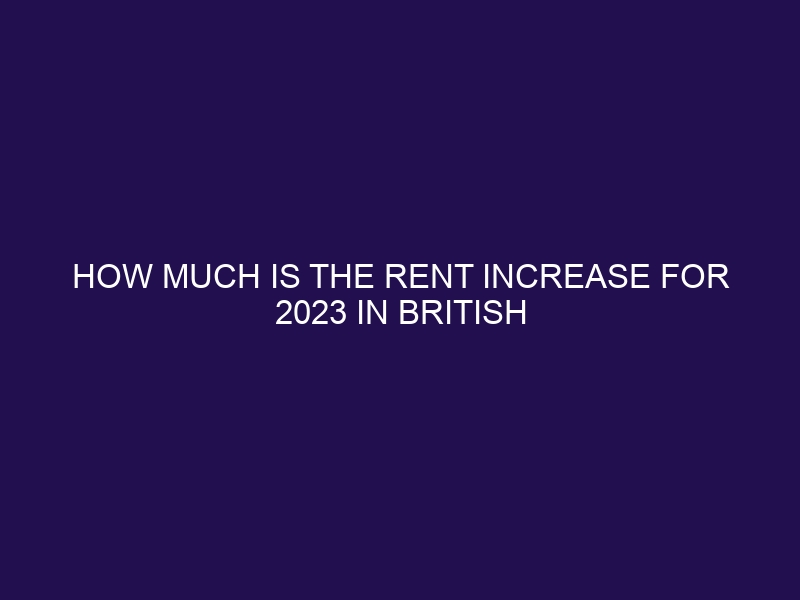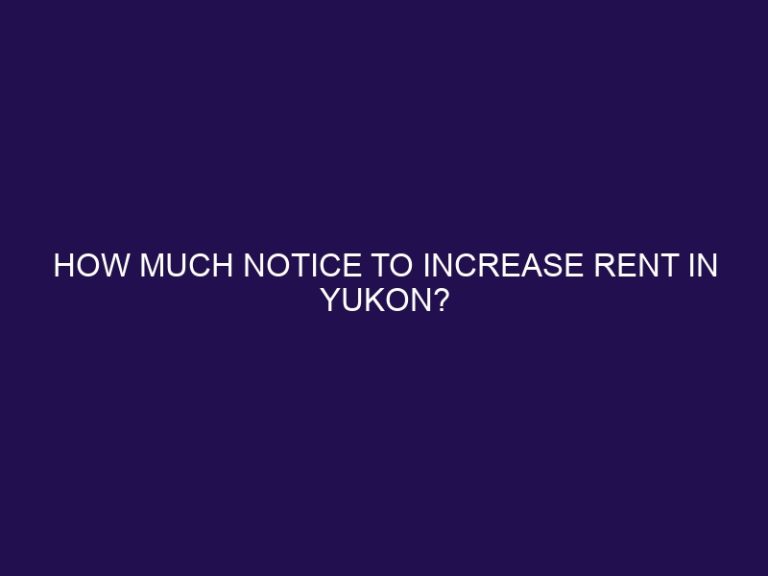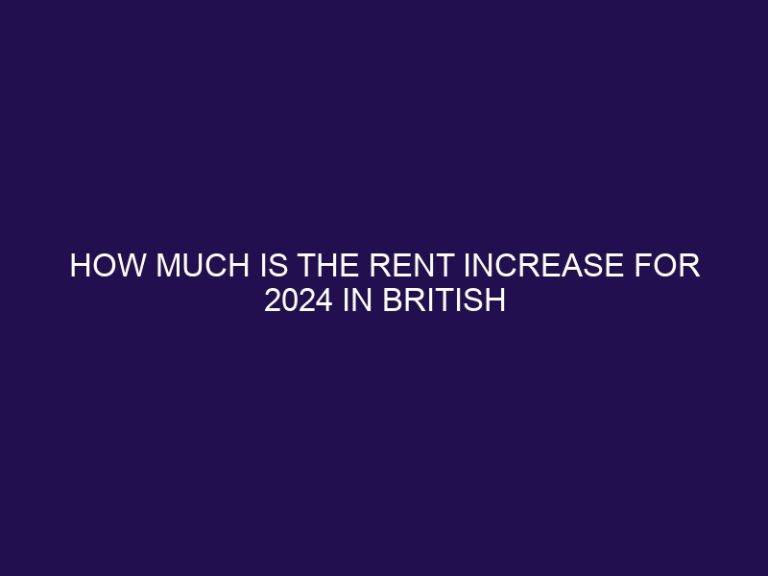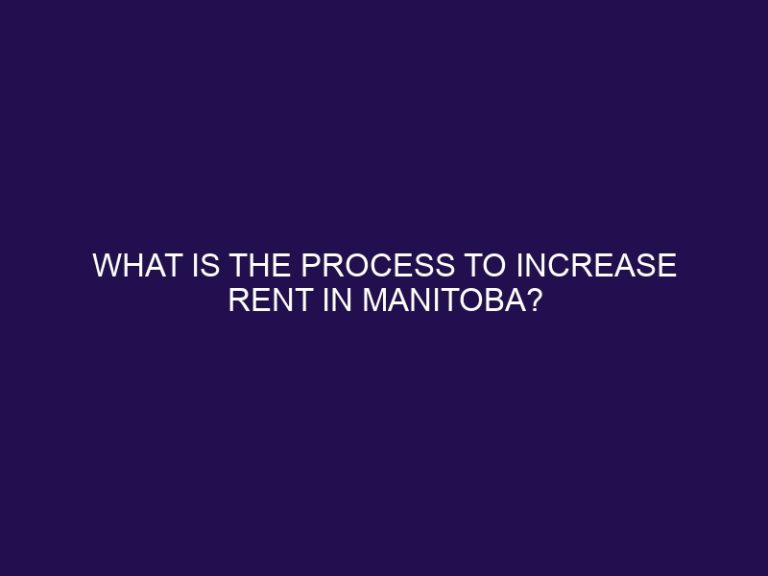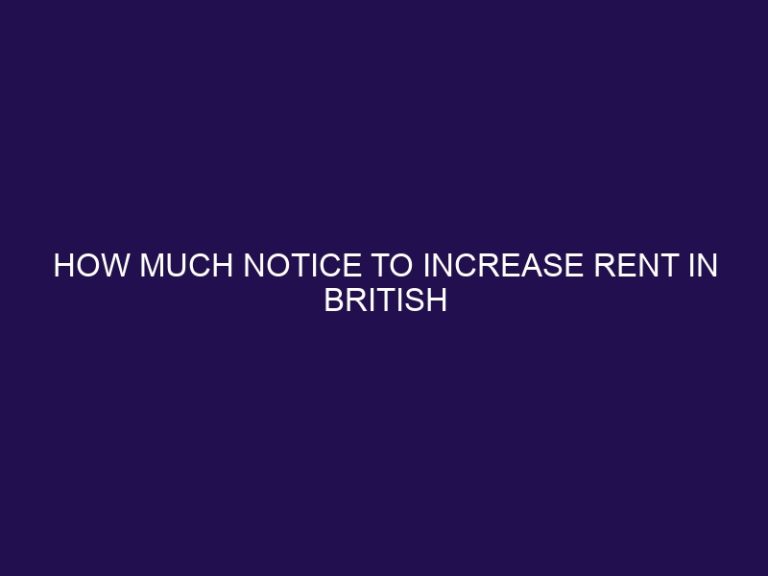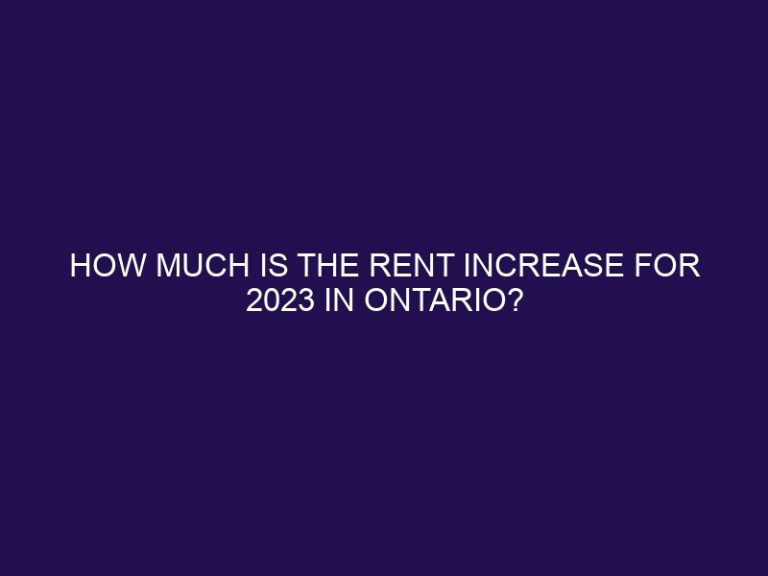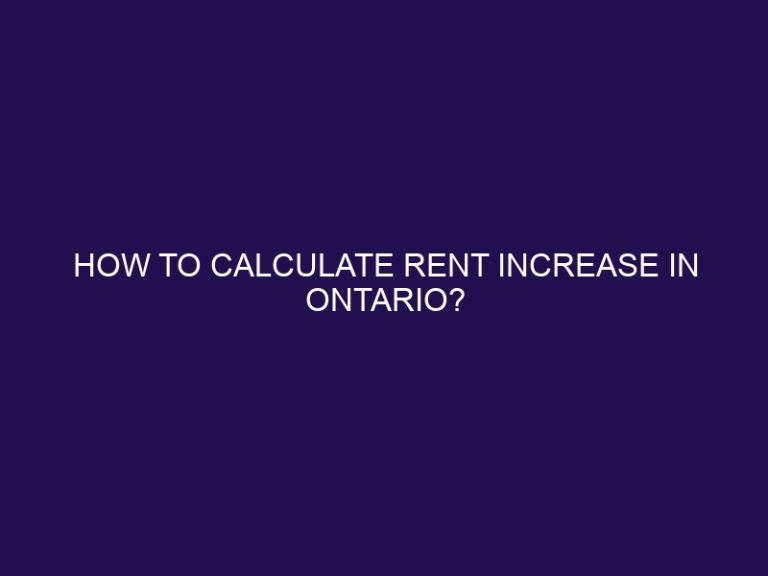How much is the rent increase for 2023 in British Columbia?
.jpg)
Rent increases are important considerations for both landlords and tenants in British Columbia. Understanding the rent increase guidelines is crucial to ensure fair practices and compliance with the law. This article provides an overview of rent increase in British Columbia and explores the guidelines, calculations, and announcements for the upcoming year.
The first section begins with an overview of rent increase in British Columbia, discussing the understanding of rent increase guidelines. It further dives into the topic by exploring what rent increase guidelines are, who sets them, and how they are calculated. This section provides essential information on the regulatory framework surrounding rent increases in British Columbia.
The second section focuses specifically on the rent increase for 2023 in British Columbia. It includes the announcement of the rent increase percentage for the upcoming year and investigates the impact of these increases on tenants. It explores the limitations and exemptions to the rent increase guidelines.
Moving forward, the article addresses the process of determining the rent increase for a rental property in British Columbia. It offers a step-by-step guide to calculating rent increases and highlights important considerations for both landlords and tenants in this regard.
The rights and responsibilities of landlords and tenants regarding rent increase are also emphasized in a dedicated section. This includes the legal rights of both parties and their obligations and responsibilities when it comes to rent increases.
To support landlords and tenants, the article provides resources and information on where to seek assistance and support. It mentions tenant rights organizations and landlord associations that can provide guidance and relevant resources.
Key takeaways:
- Rent increase guidelines for 2023 in British Columbia: The rent increase percentage for 2023 in British Columbia has been announced. This information is crucial for both landlords and tenants to understand and plan their finances accordingly.
- Impact on tenants: The rent increase in 2023 may have significant financial implications for tenants, potentially leading to higher housing costs and affordability challenges. Tenants should be aware of their rights and seek assistance if needed.
- Limitations and exemptions: While there are rent increase guidelines in place, there are also limitations and exemptions that may apply. Landlords and tenants need to be familiar with these regulations to ensure compliance and avoid any legal disputes.
Overview of Rent Increase in British Columbia
The importance of understanding the guidelines for rent increase in British Columbia cannot be overstated. These guidelines not only determine the maximum amount a landlord can increase the rent but also provide safeguards for tenants. The Overview of Rent Increase in British Columbia offers comprehensive information about how these guidelines are established, their calculation method, and their impact on tenants. Additionally, it addresses the rights and responsibilities of both landlords and tenants regarding rent increases. Organizations and associations specializing in tenant rights and landlord assistance are available to provide support to both parties involved in the rental process. Familiarizing oneself with these guidelines is crucial for a smooth and fair rental experience in British Columbia.
Understanding Rent Increase Guidelines in British Columbia
Understanding rent increase guidelines in British Columbia is crucial for both tenants and landlords. It is essential to be aware of the annual rent increase limits set by the provincial government to ensure fair and affordable housing. In the year 2023, the rent increase guideline in British Columbia stands at 1.5%. Landlords are required to follow this guideline unless they have been granted an approved exception. This limit serves as a safeguard against excessive rent hikes and promotes stability in rental costs. It is important for tenants to acquaint themselves with these guidelines, as it will enable them to understand their rights and effectively negotiate rent increases. For landlords, adhering to the regulations is imperative not only to avoid legal consequences but also to maintain positive relationships with tenants. Ultimately, a clear understanding of rent increase guidelines is crucial for fostering a harmonious rental market in British Columbia.
What are Rent Increase Guidelines?
Rent increase guidelines determine the maximum amount that landlords in British Columbia can increase the rent for existing tenants. These guidelines, also known as “rent increase guidelines,” ensure that rents are increased fairly and reasonably. They are set by the British Columbia government and are based on factors such as the rent increase formula and the provincial inflation rate. Landlords must adhere to these rent increase guidelines and cannot increase the rent by more than the specified percentage. Understanding what rent increase guidelines are is crucial for both landlords and tenants to ensure that their rights are protected and that they are not subjected to excessive rent hikes.
Who Sets the Rent Increase Guidelines in British Columbia?
In British Columbia, the rent increase guidelines are set by the provincial government. The Residential Tenancy Branch (RTB), a branch of the Ministry of Municipal Affairs and Housing, is responsible for establishing these guidelines. They ensure that rent increases are fair and reasonable, balancing the rights of landlords and tenants. The RTB, who sets the rent increase guidelines in British Columbia, takes into account various factors such as inflation, market conditions, and the cost of maintaining rental properties when determining the permissible rent increase percentage for each year. It is important for both landlords and tenants to familiarize themselves with these guidelines to understand their rights and responsibilities. Fun Fact: The RTB also provides resources and support to landlords and tenants regarding rent increase related matters.
How are Rent Increase Guidelines Calculated?
Rent increase guidelines in British Columbia are calculated using a specific formula. How are Rent Increase Guidelines Calculated? The formula takes into account the percentage change in the average weekly wages of ordinary residents in British Columbia, as well as the percentage change in the Consumer Price Index for British Columbia. These factors are used to determine the maximum allowable rent increase for the upcoming year. The formula ensures that rent increases are reasonable and fair, based on economic indicators. By using this formula, the government aims to strike a balance between protecting tenants from excessive rent increases while also considering the financial viability of rental property owners.
Rent Increase for 2023 in British Columbia
Renters in British Columbia, get ready for what’s coming your way in 2023! In this section, we’ll dive into the anticipated rent increase for the upcoming year. We’ll reveal the announced rent increase percentage, explore how this change will impact tenants across the province, and shed light on the limitations and exemptions that may apply to the rent increase guidelines. Stay tuned to discover what awaits in the realm of rent prices in British Columbia for 2023!
Announcement of Rent Increase Percentage for 2023
The provincial government recently made an important announcement regarding the rent increase percentage for 2023 in British Columbia. This announcement holds significant value as it determines the maximum amount by which landlords can raise the rent for residential properties within the province. To effectively manage their finances, it is crucial for both landlords and tenants to stay informed about this percentage. Although the specific percentage for 2023 is not mentioned in the article title, its significance is highlighted. When considering a rent increase, landlords must adhere to the guidelines and regulations established by the provincial government. Simultaneously, tenants must be knowledgeable about their rights and responsibilities concerning this announcement.
Impact of Rent Increase on Tenants
The impact of rent increase on tenants can be significant, affecting their financial stability and quality of life. The Impact of Rent Increase on Tenants can strain budgets and make it difficult to afford other necessities or save for the future. Tenants may be forced to make sacrifices, such as cutting back on groceries, transportation, or healthcare. In some cases, tenants may be forced to relocate to more affordable areas or compromise on the quality of housing. Rent increases can also contribute to housing instability, as tenants may face eviction if they cannot afford the new rent. Ultimately, the impact of rent increase on tenants depends on their individual circumstances and ability to absorb the additional costs.
Limitations and Exemptions to Rent Increase Guidelines
“`
- Fixed-term tenancies: Rent increase guidelines do not apply to fixed-term tenancies when the rent is agreed upon in advance.
- Newly constructed rental units: Rental units constructed after November 15, 2018, are exempt from rent increase guidelines for the first five years.
- Non-profit housing providers: Non-profit housing providers are exempt from rent increase guidelines.
- Vacancy rent increases: When a rental unit becomes vacant, landlords may increase the rent without being bound by rent increase guidelines.
- Illegal rent increases: Landlords cannot increase rent above the allowable limit or without proper notice, and tenants have the right to dispute unlawful rent increases.
Limitations and Exemptions to Rent Increase Guidelines:
- Fixed-term tenancies: Rent increase guidelines do not apply to fixed-term tenancies when the rent is agreed upon in advance.
- Newly constructed rental units: Rental units constructed after November 15, 2018, are exempt from rent increase guidelines for the first five years.
- Non-profit housing providers: Non-profit housing providers are exempt from rent increase guidelines.
- Vacancy rent increases: When a rental unit becomes vacant, landlords may increase the rent without being bound by rent increase guidelines.
- Illegal rent increases: Landlords cannot increase rent above the allowable limit or without proper notice, and tenants have the right to dispute unlawful rent increases.
“`
How to Determine the Rent Increase for Your Rental Property
Curious about how to calculate the rent increase for your rental property in British Columbia for 2023? Look no further! In this section, we will provide you with a step-by-step guide on determining the rent increase. We’ll break down the calculations and shed light on important considerations for both landlords and tenants. Get ready to navigate the world of rental property rates with confidence and make informed decisions for the upcoming year. Let’s dive in!
Step-by-Step Guide to Calculating Rent Increase
- Follow this step-by-step guide to calculating rent increase for your rental property:
- Review the rent increase guidelines in your jurisdiction to ensure compliance with local regulations.
- Determine the maximum allowable rent increase percentage set by the governing body.
- Calculate the dollar amount of the rent increase by multiplying the current rent by the percentage increase.
- Consider any additional factors that may impact the rent increase, such as the addition of new amenities or renovations.
- Notify your tenants of the rent increase in writing, including the effective date and the new rent amount.
- Provide tenants with proper notice based on local laws and regulations.
- Keep documentation of the rent increase for your records and provide a copy to your tenants.
By following this step-by-step guide to calculating rent increase, landlords can ensure a fair and legal rent increase, while maintaining positive relationships with their tenants.
Considerations for Landlords and Tenants
When it comes to rent increases, both landlords and tenants need to take into account considerations for landlords and tenants. Here are some important factors to keep in mind:
- Market Conditions: Landlords should consider the current rental market and whether it’s appropriate to raise the rent based on supply and demand.
- Local Regulations: Familiarize yourself with the rent increase guidelines set by the government or relevant housing authority.
- Tenant’s Financial Situation: Landlords should assess whether a rent increase is affordable for the tenant and if it may cause financial hardship.
- Maintenance and Improvements: Consider any recent repairs or upgrades made to the rental property that may justify a rent increase.
- Communication and Transparency: Landlords should clearly communicate the reasons for a rent increase and discuss it with tenants in a respectful manner.
John, a landlord, had been contemplating a rent increase for his tenants. After considering their financial situation and finding out that they were struggling, he decided to hold off on the increase and worked out a plan to provide them with more time to adjust. This understanding approach helped maintain a positive landlord-tenant relationship.
Rights and Responsibilities of Landlords and Tenants in Regards to Rent Increase
Rent increase is a hot topic in British Columbia for 2023, but what about the rights and responsibilities of landlords and tenants? In this section, we’ll dive into the legal rights of landlords and tenants, exploring their obligations and responsibilities. From knowing what landlords can and cannot do to understanding the protection tenants should expect, we’ll uncover important information that every renter and landlord should be aware of. Stay tuned to learn more about this crucial aspect of renting in British Columbia.
Legal Rights of Landlords
Landlords in British Columbia possess a set of legal rights that safeguard a fair and efficient rental process. As proprietors of rental properties, landlords have the authority to establish rent amounts in accordance with prevailing market rates and conditions. Moreover, they retain the privilege to collect rent from tenants promptly and in its entirety. Should tenants violate the lease agreement or cause damage to the property, landlords maintain the right to request their eviction. An essential aspect for landlords is to comprehensively comprehend and honor tenants’ rights, fostering a positive and harmonious landlord-tenant relationship. It is highly recommended for landlords to obtain legal guidance and acquaint themselves with the specific legal rights they possess in British Columbia.
Legal Rights of Tenants
- Tenants have the legal rights to live in a rental property that meets health, safety, and building code standards.
- Tenants have the legal rights to privacy and cannot be evicted without proper notice and legal grounds.
- Tenants have the legal rights to a written tenancy agreement that outlines terms, rent amount, and responsibilities.
- Tenants have the legal rights to request repairs and maintenance from the landlord, who is responsible for keeping the property in good condition.
- Tenants have the legal rights to dispute unfair rent increases or unfair eviction notices through the Residential Tenancy Branch.
Fun Fact: In British Columbia, tenants have the legal rights to organize and form tenant union groups to collectively advocate for their rights.
Obligations and Responsibilities of Both Parties
- Landlords have the obligation of maintaining the rental property, ensuring it meets health and safety standards, and addressing any necessary repairs or maintenance. Similarly, tenants have the responsibility of paying rent on time, keeping the property clean and in good condition, and notifying the landlord of any necessary repairs or maintenance.
- Communication: Both parties should maintain open and transparent communication, discussing any issues or concerns regarding the rental property promptly.
- Respect for privacy: Landlords must respect the privacy of tenants and provide proper notice before entering the rental property, while tenants should respect the landlord’s property and privacy as well.
- Adherence to legal requirements: Both parties must adhere to the legal requirements outlined in the tenancy agreement and relevant laws, including following proper eviction procedures if necessary.
Resources and Support for Landlords and Tenants
Looking for resources and support as a landlord or tenant in British Columbia? Look no further! In this section, we’ll provide you with valuable information and assistance to navigate the world of renting. We’ll explore tenant rights organizations and landlord associations that can offer guidance and support. We’ll give you a summary of the rent increase guidelines for 2023 in British Columbia. Whether you’re a landlord or a tenant, these resources will ensure you stay informed and empowered.
Where to Seek Information and Assistance
When navigating rent increase guidelines in British Columbia, it’s essential to know where to seek information and assistance. Here are some suggestions:
1. Government Websites: Visit the official websites of organizations like the Residential Tenancy Branch or the British Columbia Housing Management Commission for accurate and up-to-date information on where to seek information and assistance regarding rent increase guidelines.
2. Tenant Rights Organizations: Connect with local tenant rights organizations such as the Tenant Resource and Advisory Centre (TRAC) or the Vancouver Tenants Union. They can provide guidance and support on where to seek information and assistance regarding rent increase concerns.
3. Landlord Associations: Seek assistance from landlord associations like LandlordBC or the Professional Association of Managing Agents (PAMA). They can provide resources and advice for landlords navigating the rent increase process, including where to seek information and assistance.
Remember, accessing reliable and knowledgeable sources can help tenants and landlords understand their rights and responsibilities when it comes to rent increases.
Tenant Rights Organizations
Tenant rights organizations, such as the Tenant Resource and Advisory Centre (TRAC), BC Housing, the Residential Tenancy Branch (RTB), and the Tenants’ Rights Action Coalition (TRAC), play a crucial role in advocating for tenants’ rights and providing support and resources. These organizations offer various services to tenants, including legal advice, counseling, and educational resources. They serve as valuable resources for tenants facing issues with their landlords or in need of guidance on their rights and responsibilities. Ensure to reach out to these tenant rights organizations for assistance and support. TRAC, for instance, provides information and resources on tenants’ rights and the Residential Tenancy Act in British Columbia, along with a free tenant hotline and access to legal advocates. BC Housing offers programs and resources for low-income tenants, including rental assistance and subsidized housing options, while also providing information on tenants’ rights and responsibilities. The RTB is a government agency that enforces the Residential Tenancy Act and offers information on tenancy laws, dispute resolution services, and resources for tenants. TRAC, as a non-profit organization, advocates for tenants’ rights and provides education and support through workshops, publications, and assistance with tenancy issues. Remember, these tenant rights organizations are here to assist and support you.
Landlord Associations
Landlord Associations in British Columbia can be a valuable resource and support system for both experienced and new landlords. These associations provide a wide range of benefits, including access to education and training programs, networking opportunities with other landlords, and guidance on navigating legal requirements. By becoming a member of a landlord association, landlords can stay up-to-date with the latest industry trends and regulations. Additionally, they can receive assistance with tenant screening and dispute resolution, as well as gain access to various templates and forms for lease agreements and other important documentation. It is worth noting that joining a landlord association is a Pro-tip that can help landlords stay informed and build a strong professional network, ultimately enhancing their ability to effectively manage their rental properties.
Summary of Rent Increase Guidelines in British Columbia
| Summary of Rent Increase Guidelines in British Columbia | Who Sets the Guidelines | Calculation Method | 2023 Rent Increase Percentage | Impact on Tenants |
|
What are rent increase guidelines? |
Government of British Columbia |
Based on inflation rate |
[Actual percentage] |
Potential financial burden on tenants |
|
Limitations and exemptions |
Various criteria |
Depends on specific circumstances |
No increase for certain tenancies |
Protection for vulnerable tenants |
|
Calculating rent increase |
Step-by-step process |
Takes into account current rent |
[Actual calculation] |
Ensuring fairness for landlords and tenants |
|
Rights and responsibilities |
Legal obligations |
Both landlords and tenants |
Legal rights and responsibilities |
Maintaining a balanced landlord-tenant relationship |
|
Resources and support |
Tenant rights organizations |
Landlord associations |
Access to information and assistance |
Helping both parties navigate the rental process |
Some Facts About the Rent Increase for 2023 in British Columbia:
- ✅ Landlords in British Columbia will be allowed to raise rents up to 3.5% in 2024. (Source: CBC News)
- ✅ This rent increase is below the current rate of inflation, which is 5.6%. (Source: Our Team)
- ✅ Both tenants and landlords have expressed dismay over the announced increase. (Source: Our Team)
- ✅ Rising costs such as interest rates, property taxes, utility costs, insurance costs, and maintenance costs have made it difficult for landlords to operate rental housing. (Source: Our Team)
- ✅ Some experts suggest that rent increases below the rate of inflation may discourage investment in rental housing. (Source: Our Team)
Frequently Asked Questions
How much is the rent increase for 2023 in British Columbia?
The rent increase for 2023 in British Columbia has been set at 2%.
Is there a rent increase freeze in British Columbia?
Yes, a rent increase freeze was implemented in 2020 and 2021 in British Columbia due to the COVID-19 pandemic.
What are the rising costs that landlords in British Columbia are facing?
Landlords in British Columbia are facing rising costs such as interest rates, property taxes, utility costs, insurance costs, and maintenance costs.
How does the rent increase rate in British Columbia compare to the rate of inflation?
The rent increase rate in British Columbia is lower than the current rate of inflation, which is 5.6%.
Are there any exceptions to the maximum allowable rent increase in British Columbia?
Yes, the maximum allowable rent increase does not apply to commercial tenancies, non-profit housing tenancies with income-based rent, co-operative housing, and some assisted-living facilities.
What is the government’s plan for annual rent increases in British Columbia?
The government plans to return to an annual rent increase tied to the Consumer Price Index (CPI) once inflation levels normalize.

